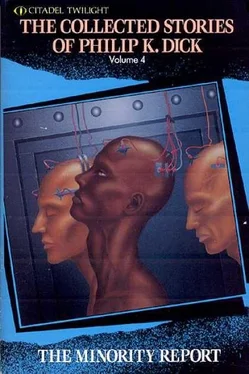Philip K. Dick
The Complete Stories of Philip K. Dick Vol. 4:
The Minority Report and Other Classic Stories
Introduction By James Tiptree, Jr.
How do you know you're reading Philip K. Dick?
I think, first and pervasively, it was the strangeness. Strange, Dick was and is. I think it was that which kept me combing the SF catalogs for more by him, waiting for each new book to come out. One hears it said, "X just doesn't think like other people." About Dick, it was true. In the stories, you can't tell what's going to happen next.
And yet his characters are seemingly designed to be ordinary people – except for the occasional screaming psychotic female who is one of Dick's specialties, and is always treated with love. They are ordinary people caught up in wildly bizarre situations, running a police force with the help of the mumblings of precognitive idiots, facing a self-replicating factory that has taken over the earth. Indeed, one of the factors in the strangeness is the care Dick takes to set his characters in the world of reality, an aspect most other writers ignore.
In how many other science fiction stories do you know what the hero does for a living when he isn't caught up in the particular plot? Oh, he may be a member of a space crew, or, vaguely, a scientist. Or Young Werther. In Dick, you are introduced to the hero's business concerns on page one. That's not literally true of the short stories in this volume (I went back and checked), but the impression of the pervasiveness of "grubby" business concerns is everywhere, especially in the novels. The hero is in the antique business, say; as each new marvel turns up, he ruminates as to whether it is saleable. When the dead talk, they offer business advice. Dick never sheds his concern that we know how his characters earn their bread and butter. It is a part of the peculiar "grittiness" of Dick's style.
Another part of the grittiness is the jerkiness of the dialog. I can never decide whether Dick's dialog is purely unreal, or more real than most. His people do not interact as much as they deliver monologs to carry on the plot, or increase the reader's awareness of a situation.
And the situations are purely Dick. His "plots" are like nothing else in SF. If Dick writes a time-travel story, say, it will have a twist on it that makes it sui generis. Quite typically, the central gee-whiz marvel will not be centered, but will come at you obliquely, in the course, for instance, of a political election.
And any relation between Dick and a nuts-and-bolts SF writer is a pure coincidence. In my more sanguine moments, I concede that he probably knows what happens when you plug in a lamp and turn it on, but beyond that there is little evidence of either technology or science. His science, such as it is, is all engaged in the technology of the soul, with a smattering of abnormal psychology.
So far I have perhaps emphasized his oddities at the expense of his merits. What keeps you reading Dick? Well, for one thing, the strangeness, as I said, but within it there is always the atmosphere of striving, of men desperately trying to get some necessary job done, or striving at least to understand what is striking at them. A large percentage of Dick's heroes are tortured men; Dick is expert at the machinery of despair.
And another beauty is the desolations. When Dick gives you a desolation, say after the bomb, it is a desolation unique of its kind. There is one such in this book. But amid the desolation you often find another of Dick's characteristic touches, the little animals.
The little animals are frequently mutants, or small robots who have taken on life. They are unexplained, simply noted by another character in passing. And what are they doing? They are striving, too. A freezing sparrow hugs a rag around itself, a mutant rat plans a construction, "peering and planning." This sense of the ongoing busy-ness of life, however doomed, of a landscape in which every element has its own life, is trying to live, is typically and profoundly Dick. It carries the quality of compassion amid the hard edges and the grit, the compassion one suspects in Dick, but that never appears frontally. It is this quality of love, always quickly suppressed, that gleams across Dick's rubbled plains and makes them unique and memorable.
James Tiptree, Jr.
December, 1986
I used to believe the universe was basically hostile. And that I was misplaced in it, I was different from it… fashioned in some other universe and placed here, you see. So that it zigged while I zagged. And that it had singled me out only because there was something weird about me. I didn't really groove with the universe.
I had a lot of fears that the universe would discover just how different I was from it. My only suspicion about it was that it would find out the truth about me, and its reaction would be perfectly normal: it would get me. I didn't feel that it was malevolent, just perceptive. And there's nothing worse that a perceptive universe if there's something weird about you.
But this year I realized that that's not true. That the universe is perceptive, but it's friendly… I just don't feel that I'm different from the universe anymore.
– Philip K. Dick in an interview, 1974.
(from ONLY APPARENTLY REAL)
Tension hung over the three waiting men. They smoked, paced back and forth, kicked aimlessly at weeds growing by the side of the road. A hot noonday sun glared down on brown fields, rows of neat plastic houses, the distant line of mountains to the west.
"Almost time," Earl Ferine said, knotting his skinny hands together. "It varies according to the load, a half second for every additional pound."
Bitterly, Morrison answered, "You've got it plotted? You're as bad as it is. Let's pretend it just happens to be late."
The third man said nothing. O'Neill was visiting from another settlement; he didn't know Ferine and Morrison well enough to argue with them. Instead, he crouched down and arranged the papers clipped to his aluminum check-board. In the blazing sun, O'Neill's arms were tanned, furry, glistening with sweat. Wiry, with tangled gray hair, horn-rimmed glasses, he was older than the other two. He wore slacks, a sports shirt and crepe-soled shoes. Between his fingers, his fountain pen glittered, metallic and efficient.
"What're you writing?" Ferine grumbled.
"I'm laying out the procedure we're going to employ," O'Neill said mildly. "Better to systemize it now, instead of trying at random. We want to know what we tried and what didn't work. Otherwise we'll go around in a circle. The problem we have here is one of communication; that's how I see it."
"Communication," Morrison agreed in his deep, chesty voice. "Yes, we can't get in touch with the damn thing. It comes, leaves off its load and goes on – there's no contact between us and it."
"It's a machine," Ferine said excitedly. "It's dead – blind and deaf."
"But it's in contact with the outside world," O'Neill pointed out. "There has to be some way to get to it. Specific semantic signals are meaningful to it; all we have to do is find those signals. Rediscover, actually. Maybe half a dozen out of a billion possibilities."
A low rumble interrupted the three men. They glanced up, wary and alert. The time had come.
"Here it is," Ferine said. "Okay, wise guy, let's see you make one single change in its routine."
The truck was massive, rumbling under its tightly packed load. In many ways, it resembled conventional human-operated transportation vehicles, but with one exception – there was no driver's cabin. The horizontal surface was a loading stage, and the part that would normally be the headlights and radiator grill was a fibrous spongelike mass of receptors, the limited sensory apparatus of this mobile utility extension.
Читать дальше










